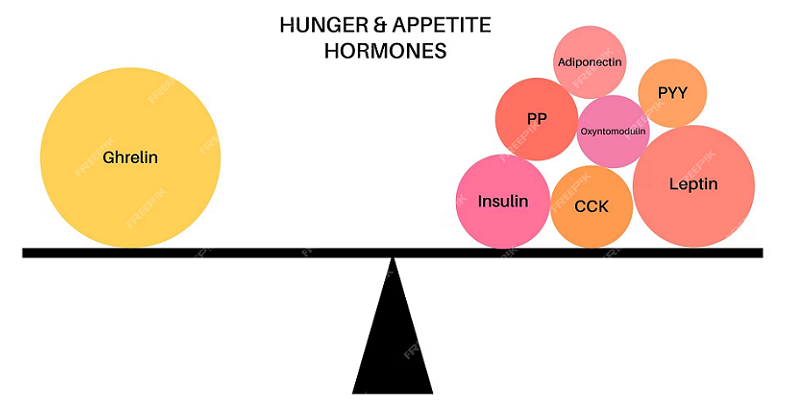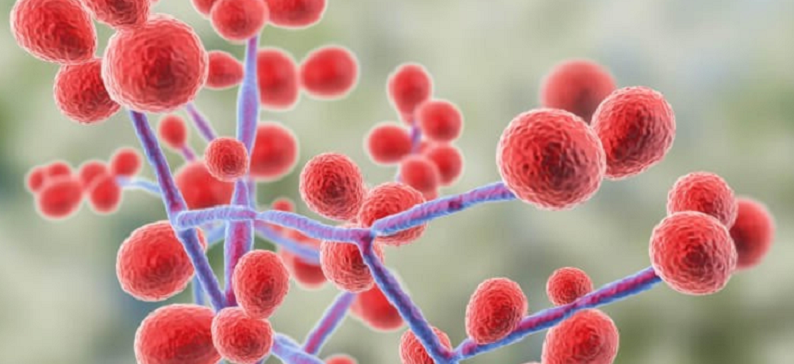
In the intricate dance of hormones that govern our body’s functions, Peptide YY (PYY) plays a fascinating and vital role. This hormone, primarily known for its influence on appetite and satiety, is a key player in the complex interactions between our digestive system and brain health. PYY, a gut-derived hormone, not only signals fullness but also impacts our gut health, which in turn has surprising connections to cognitive functions. Here we uncover PYY’s structure, how it’s produced in our bodies, and its crucial role in regulating appetite. Beyond satiety, our journey will reveal PYY’s significant impact on the health of our gut—a cornerstone of overall well-being—and how this, in turn, influences our cognitive abilities.
Contents
Understanding Peptide YY (PYY)
Before jumping into the specific roles and impacts of Peptide YY (PYY), it’s essential to understand what this hormone is and how it functions within the human body.
Structure and Production of Peptide YY (PYY)
Peptide YY is a short peptide hormone, comprising 36 amino acids. It is primarily synthesized and secreted by L-cells in the gastrointestinal tract, especially in the ileum and colon. The structure of PYY is critical to its function, as it allows the hormone to interact effectively with specific receptors in the body, notably the neuropeptide Y (NPY) receptors.
PYY production is stimulated by the intake of food, particularly meals high in fat and protein. Upon eating, PYY is released into the bloodstream, beginning its role in regulating various bodily functions. The speed and magnitude of PYY release depend on the composition and quantity of the consumed food, which explains why different meals might have varying effects on our feelings of fullness and digestion.
Different Forms of PYY and Their Functions
Interestingly, Peptide YY exists in two main forms: PYY1-36 and PYY3-36. Each form has distinct functions and interacts differently with receptors in the body.
PYY1-36, the full-length form, can bind to multiple NPY receptors, including Y1, Y2, and Y5 receptors. It plays a role in various physiological processes such as inhibiting gastric motility and pancreatic secretion, thus slowing down digestion.
On the other hand, PYY3-36, the more abundant form post-meal, primarily targets the Y2 receptor. This interaction is crucial in reducing appetite and inhibiting food intake. PYY3-36 does this by acting on specific areas of the brain, including the hypothalamus, known for controlling hunger and satiety [1].
Regulation and Release of PYY in the Body
The regulation and release of PYY are complex and influenced by several factors. As mentioned earlier, the type of food consumed is a primary trigger for PYY release. High-protein and high-fat meals tend to induce greater PYY secretion compared to high-carbohydrate meals.
Beyond dietary triggers, PYY levels are also influenced by the circadian rhythm and physical activity. Studies have suggested that PYY levels vary throughout the day, with certain peak times typically after meals.
Additionally, the body’s feedback mechanisms play a role in regulating PYY. For instance, when PYY levels are high, signaling satiety, the production of hunger hormones like ghrelin is suppressed. This regulation ensures a balanced approach to hunger management, preventing overeating and promoting a healthy appetite.

PYY and Satiety
Peptide YY (PYY) plays a critical role in managing our feelings of fullness and hunger, known as satiety. This hormone is a key component in the complex regulatory system that helps balance our food intake.
How PYY Influences Appetite
After eating, as PYY levels increase, a signal is sent to the brain, particularly to the hypothalamus, indicating that the body has received enough food. This process helps in reducing appetite and prolonging the feeling of fullness after a meal. PYY’s ability to decrease appetite is a natural mechanism to prevent overeating. It’s interesting to note that individuals who are obese often have lower baseline levels of PYY, which might contribute to difficulties in feeling full, leading to increased food intake [2].
PYY does not work in isolation. Its effect on appetite is part of a larger symphony of hormonal interactions that manage our food intake. Understanding how PYY operates in tandem with these hormones offers insights into the complex nature of hunger and satiety.
The Relationship Between PYY and Hunger Hormones
The balance between PYY and other hormones, particularly ghrelin – the hunger hormone – is crucial. While PYY signals satiety, ghrelin promotes hunger. After a meal, as PYY levels rise, ghrelin levels fall, reducing the urge to eat. This inverse relationship helps regulate eating patterns and maintains energy balance.
Besides ghrelin, PYY also interacts with other hormones like leptin, secreted by adipose tissue. Leptin plays a role in long-term energy balance and appetite control. In healthy individuals, these hormones work harmoniously to regulate food intake, but in conditions like obesity, this balance can be disrupted.
Impact of PYY on Eating Behaviors and Obesity
Understanding the impact of PYY on eating behaviors is crucial, especially in the context of obesity. Research suggests that individuals with lower PYY levels may experience less satiety, leading to increased food intake and weight gain. This observation has sparked interest in PYY as a potential target for obesity treatments [3].
The relationship between PYY levels and obesity is bidirectional. Not only can low PYY levels contribute to the development of obesity, but obesity itself can alter PYY’s effectiveness in signaling satiety. Addressing this hormonal imbalance could be a key strategy in managing and treating obesity.
Moreover, lifestyle factors, including diet and exercise, can influence PYY levels. For instance, diets rich in protein and fiber have been shown to increase PYY secretion, enhancing satiety and potentially aiding weight management.
PYY and Gut Health
The relationship between Peptide YY (PYY) and gut health is a critical aspect of understanding this hormone’s broader implications. PYY, produced in the gastrointestinal tract, not only influences feelings of fullness but also plays a significant role in maintaining the health and functionality of the gut.
Interaction of PYY with Gut Microbiota
The gut microbiota, comprising various bacteria and other microorganisms, plays a pivotal role in overall health, including digestion, immune function, and even mental health. PYY influences the gut microbiota in several ways. It affects gut motility, which in turn can impact the composition and activity of gut bacteria. Slow motility allows for increased nutrient absorption and can alter the bacterial population in the gut, potentially leading to a healthier gut environment.
Furthermore, studies suggest that the gut microbiota can influence PYY secretion. Certain bacterial strains have been found to promote the release of PYY, enhancing satiety signals and contributing to a more balanced gut environment. This bidirectional relationship highlights the importance of a healthy gut microbiota in maintaining optimal PYY levels and functionality.
Role of PYY in Digestive Processes
In addition to its role in signaling satiety, PYY is integral in the regulation of digestive processes. It slows gastric emptying and intestinal motility, allowing more time for the absorption of nutrients. This slower movement through the digestive tract is beneficial for nutrient uptake but also influences the gut microbiota composition and activity.
PYY also impacts the secretion of digestive juices and enzymes, further illustrating its role in the efficient functioning of the digestive system. These effects underscore PYY’s importance not just in appetite regulation but also in the overall health and efficiency of the gastrointestinal system [4].
The Effect of Gut Health on PYY Levels
The state of gut health can significantly impact the levels of PYY. Conditions that affect the gut, such as inflammatory bowel disease, irritable bowel syndrome, and even obesity, can alter PYY secretion. For example, inflammation in the gut can disrupt the L-cells responsible for PYY production, leading to altered levels of the hormone.
Moreover, dietary choices that promote a healthy gut, such as a diet rich in fiber, can enhance PYY secretion. This relationship suggests that maintaining a healthy gut not only benefits digestion and overall health but also helps regulate appetite and energy balance through PYY.

Cognitive Connections of PYY
The influence of Peptide YY (PYY) extends beyond the realms of satiety and gut health, reaching into cognitive functions.
PYY’s Influence on Brain Function
The brain-gut axis is a critical pathway through which the gut communicates with the brain, and PYY is a significant part of this communication. PYY can cross the blood-brain barrier and interact with brain regions involved in appetite regulation, such as the hypothalamus. However, its impact goes beyond appetite control. Research suggests that PYY may also influence mood and cognitive functions such as learning and memory.
Emerging studies indicate that PYY might play a role in neurotrophic factors, which are essential for the growth and survival of neurons. Additionally, there’s growing interest in exploring how PYY influences the risk and progression of neurodegenerative diseases, given its potential effects on brain health and function [5].
The Connection Between Gut Health and Cognitive Function
The gut-brain axis highlights a fascinating aspect of human physiology where gut health directly impacts cognitive function. A healthy gut microbiota is essential for optimal brain function, with imbalances potentially leading to cognitive impairments. PYY, as a mediator in the gut-brain axis, plays a role in this interconnection.
The gut microbiota can influence PYY levels, and in turn, PYY can impact brain function. This interplay suggests that interventions targeting gut health, such as probiotics or dietary modifications, could indirectly benefit cognitive health by affecting PYY levels and activity.
Potential Therapeutic Uses of PYY in Cognitive Disorders
The cognitive connections of PYY open up potential therapeutic avenues for treating various cognitive disorders. For instance, enhancing PYY levels could be a strategy for addressing cognitive deficits associated with conditions like Alzheimer’s disease or other forms of dementia.
Additionally, given its role in mood regulation, PYY could also have implications in managing mental health conditions such as depression or anxiety. However, more research is needed to fully understand these potential applications and to develop safe and effective PYY-based therapies.
References
[1] The role of peptide YY in appetite regulation and obesity
[2] Peptide YY: more than just an appetite regulator
[3] Pancreatic polypeptide, peptide YY, and neuropeptide Y
[4] Factors affecting circulating levels of peptide YY in humans
[5] Peptide YY and neuropeptide Y in regulation of pain and spatial learning and memory

